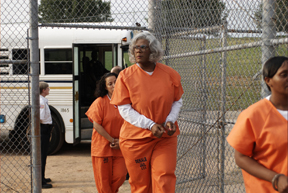 Tyler Perry is the biggest momma in the big house in Madea Goes to Jail.
Tyler Perry is the biggest momma in the big house in Madea Goes to Jail.
|
Madea Goes to Jail
Starring Tyler Perry, Derek Luke, and Keshia Knight Pulliam. Written and directed by Tyler Perry. Rated PG-13. Now playing. |
|
A D V E R T I S E M E N T
|
|
|
|
A D V E R T I S E M E N T
|
|
Mad Money
Tyler Perry knows his audience, but he’s still
out of touch.
By KRISTIAN LIN
Madea Goes to Jail is Tyler Perry’s seventh film as writer or director in only four years. In that short period of time, his filmmaking has shown noticeable improvement. His movies now look much better, they’re edited much more fluidly, and the momentum-stopping monologues doling out the story’s morals are pretty much gone. What hasn’t changed one jot is Perry’s peculiar view of the world, and unless you’re already in tune with that, his movies are going to look strange to you regardless of how well they’re made. They certainly look strange to me.
Despite its title, his current film’s main plot is taken up with an Atlanta prosecutor named Josh (Derek Luke) who’s shocked to find his childhood friend, Candace (Keshia Knight Pulliam — yes, Rudy from The Cosby Show) on his docket facing a prostitution charge. Feeling responsible for her, Josh takes her in and tries to help her get off the streets. This doesn’t please Josh’s fiancée and fellow prosecutor, Linda (Ion Overman).
Right as she is to feel suspicious, Linda loses our sympathy when she finds a beaten Candace asleep on her couch and throws a hissy fit, screaming at Josh, “I don’t care what she needs!” This isn’t surprising. If there’s one thing that Perry’s films teach us, it’s that ambitious young women with successful careers are shrill, narcissistic, conniving bitches who will cheat at their jobs or cheat on their husbands or lose themselves in work or simply hold their success over their man’s head and feel threatened if he starts to come into his own. (See The Family That Preys and Why Did I Get Married? for examples of all of those.)
Such women need to be punched in the face, in Perry’s view. His audience clearly agrees, judging by the cheers that those movies elicited when that happened. (Thankfully, in Madea Goes to Jail Josh only publicly humiliates Linda at the altar once he realizes what she is.) It’s not that Perry hates women — indeed, one of this movie’s heroines is a social worker ministering to prostitutes, luminously underplayed by Oscar nominee Viola Davis. Perry makes it clear that bad guys hit women for no reason. On the other hand, good guys hit women when they deserve it. Real life doesn’t work that way, but that doesn’t appear to have crossed his mind.
Perry’s not an old man — he turns 40 this year — yet his attitudes are as set in stone as an old man’s. His issues with women aside, he seems to think that young men who listen to hip-hop music will eventually try to shoot you. It’d be easy to dismiss him as a crank if his movies weren’t making piles of money. He’s smart enough to see that movies haven’t served the black churchgoing audience, and he’s filling the void. That’s savvy business. He knows what his audience wants, but how in touch is he really? His movies never engage the wider world; has any of his characters ever used the internet? The lack of references to politics or pop culture help make his films feel encased in amber. We just elected a black man president, one who doesn’t reduce reality to good-vs.-evil, doesn’t let small flare-ups anger him, and is the proud husband of a woman with a successful career. What would Madea think of that?
Speaking of Mabel “Madea” Simmons (played by Perry in drag), she returns to the screen after being largely absent from Perry’s three previous movies. As the title promises, the irascible old lady finally runs out of free passes from Atlanta’s justice system and gets tossed in prison. Of course, she learns nothing from this experience. You’d think that jail would scare some sense into her, but then a prison where one’s cellmate is portrayed by Sofia Vergara isn’t a scary place.
It’d be one thing if Madea were running around the fringes of Perry’s films serving as his comic id. Instead, Perry seems to regard her as a key to his whole philosophy of life. Madea loves to tell people, especially young African-Americans, that they need to stop being victims and take matters into their own hands. She then takes this good message to an unhealthy extreme by opening a can of whup-ass on everybody who so much as looks at her the wrong way. Perry never reconciles her comic violence (which isn’t funny, by the way) with his film’s Christian messages of forgiveness and love.
This comes out in Madea Goes to Jail, thanks to no less than Dr. Phil McGraw. He portrays Madea’s court-mandated anger management counselor and asks a series of eminently reasonable questions about why she has to get payback all the time. This turns unintentionally revealing, as Madea hems and haws, parrots her questioner’s questions, and angrily denies that she has an anger problem. She doesn’t have any answers for him, and so Madea ends up cut down to size by Dr. Phil, a guy who’s transparently full of crap. Then again, she’s the creation of a filmmaker who’s transparently full of crap himself. Takes one to know one, I suppose.
 Email this Article...
Email this Article...

